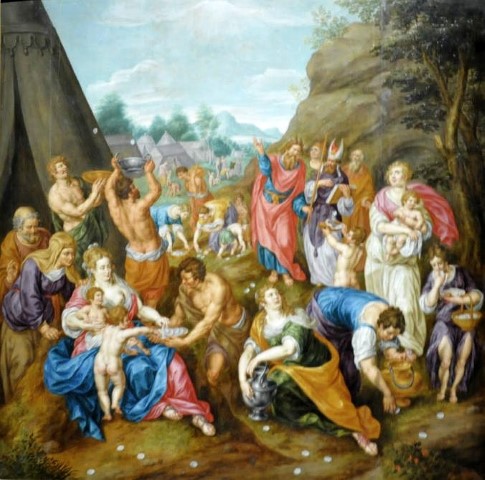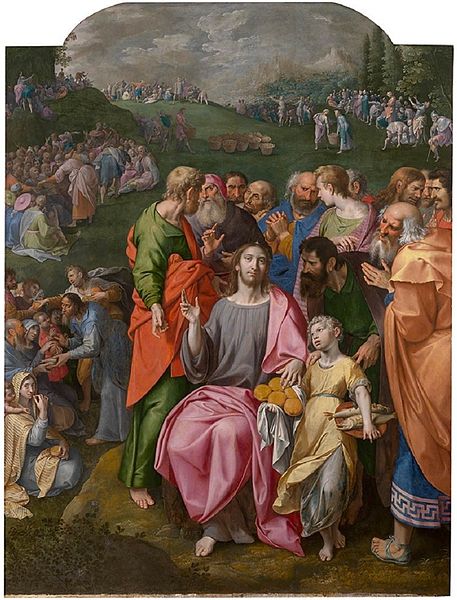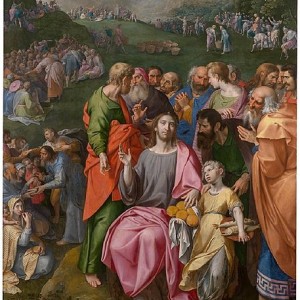
This Sunday, we read about two different groups — the Israelites in the desert, and Jesus’ followers in Capernaum — who show little loyalty to God.
In the first case, it’s right after God has freed the Israelites from Egypt. There are the ten plagues, the Passover, the parting of the Red Sea, and the Israelites are loving it! Their slave-owners are humiliated and then vanquished, and their set free from Egypt, on their way to the Promised Land!
Only problem is, this journey from slavery to freedom is a lot harder than they expected, and they start to pine for the days of slavery, when at least their material needs were met. Halfway into their second month of travelling (a journey that will ultimately take forty years), they’re ready to give up. They complain to Moses and Aaron, “Would that we had died by the hand of the Lord in the land of Egypt, when we sat by the fleshpots and ate bread to the full; for you have brought us out into this wilderness to kill this whole assembly with hunger” (Exodus 16:3). They’re willing to accept comfortable slavery over the struggle for freedom, even though they know that this slavery will impede their ability to worship God. It’s here that God provides the people with Manna from Heaven: meeting their material needs in such a way as to encourage them to remember from where these blessing come.

In John 6, we see a passage that’s reminiscent of this scene. Jesus has just performed the miracle of the multiplication of loaves, and His followers are loving it! He took five loaves and two fish, and miraculously fed a crowd of five thousand, with twelve baskets of leftovers (As an aside, I suppose that this means that Jesus basically invented bottomless breadsticks). The people respond, “This is indeed the prophet who is to come into the world!” (John 6:14). Surprisingly, Jesus isn’t thrilled with this response: “Perceiving then that they were about to come and take him by force to make him king, Jesus withdrew again to the hills by himself” (John 6:15). And why isn’t He thrilled? Because He realizes that they’re after free food, not the Truth, not a saving relationship with Him.
This becomes painfully clear the next day (John 6:26-31):
Jesus answered them, “Truly, truly, I say to you, you seek me, not because you saw signs, but because you ate your fill of the loaves. Do not labor for the food which perishes, but for the food which endures to eternal life, which the Son of man will give to you; for on him has God the Father set his seal.” Then they said to him, “What must we do, to be doing the works of God?” Jesus answered them, “This is the work of God, that you believe in him whom he has sent.” So they said to him, “Then what sign do you do, that we may see, and believe you? What work do you perform? Our fathers ate the manna in the wilderness; as it is written, ‘He gave them bread from heaven to eat.’”
So even as Jesus is encouraging them to go from an obsession with their material needs to faith in Him, the people derail the conversation back to free breadsticks. Reading these passages, it’s easy to shake our heads, and say, “You dummies, don’t you get it? It’s not about the free food!”
But before we do that, maybe we should look at our own lives a little closer. How would you feel if the parish announced Coffee and Doughnuts after Mass, and then had a Bible study instead? Would you feel ripped off to feed on the Word, rather than donuts?
So much of our days are spent chasing material things, rather than praising (or even being cognizant of) God. And so much of our time praising God is spent thanking Him for the material things. Neither of those things, of themselves are bad, but neither was the Jews’ desire to have bread when they were hungry. The danger comes when our wants and needs lead us to treat God as our Divine butler or Heavenly vending machine.
A good remedy to this is the prophet Habakkuk’s prayer (Hab. 3:17-19), in which he praises God when things are going terribly:
Though the fig tree do not blossom,
nor fruit be on the vines,
the produce of the olive fail
and the fields yield no food,
the flock be cut off from the fold
and there be no herd in the stalls,
yet I will rejoice in the Lord,
I will joy in the God of my salvation.
God, the Lord, is my strength;
he makes my feet like hinds’ feet,
he makes me tread upon my high places.
That’s a lot harder than typing “Amen” to a Facebook post asking if God has blessed you today. But it’s the kind of devotion to which we’re being called.
More than this, we’re called to praise God not just when nothing is going our well, but when we can’t feel His presence. Sometimes, God feels very close, and it’s easy to pray. Other times, He seems distant, and prayer can be a real struggle. Maybe this is our own fault: our sins and inattention are damaging that relationship; but other times, it’s part of a sort of purification of the soul. In these moments, God is inviting us to love Him for Him, and not for the good spiritual feelings He can produce in our souls. It exposes the most subtle way that we do what those Israelites did, wanting a relationship God for His good effects rather than Himself.
Here, I’d invite you to a few things.
- Practice loving God in Himself, rather than just appreciating His usefulness. Watch your own motives, and when necessary, do better.
- Pray and read Scripture more. These are great ways of encountering the living God, of learning to speak to Him, and learning to listen to Him.
- If you don’t go to Mass regularly, do so. If you have the chance to go every day, go every day. It’s your chance to receive the New Manna from Heaven, the Flesh and Blood of Jesus Christ in the Eucharist. If you’re currently unable to receive the Eucharist for some reason — you’re not a member of the Catholic Church, or some sin is keeping you from receiving — do whatever it takes to fix your situation. What could possibly be so important as to justify not receiving the Eucharist? (Answer: nothing.)

This is a beautiful and useful post, Joe. You are highlighting the preeminent dilemma every man is faced with in this world: whether the attention, focus and gravity of our lives are orientated towards God and the ‘sacred’, or whether our focus and attention is orientated towards ourselves, others, and the ‘mundane’. If everything in our lives pivots around, and is drawn to the eternal God, we will begin to be set apart from the world and become more spiritual and holy in everything we do. We will begin to ‘be holy even as your Father in Heaven is holy”. On the contrary, if our predominant orientation is towards ourselves and the world, we will not be ‘set apart’, but will be mere animals and even lower than animals. Animals were never given the potential for holiness that mankind was given, and as Jesus said: “…. unto whomsoever much is given, of him much shall be required: and to whom they have committed much, of him they will demand the more.” So to be focused predominantly on the mundane in this world is to neglect the most essential part, and even the reason for, our existence and creation: to be in full communion with our eternally loving and all good Creator. And, almost everywhere in scripture this theme is repeated, over and over again, as if it were the overriding theme of both Jesus’ teachings, as well as the entire Bible.
John Henry Newman once remarked to those who told him, (besides other things he would be giving up) , “If you become a Catholic, you will lose all of your friends! “.
He replied, “What is that to one Holy Communion? “
Good post, though I would suppose there is only one way to fix number three…
It is a great blessing for converts and others interested in the Catholic Faith to have access to #3 above, and that the Catholic Mass is available to be attended by both Catholics and non-Catholics alike, on a daily basis in practically every major city throughout the world today.
In early Pre-Nicaean Catholicism this was not the case. Access to the Holy Mass and Eucharist was not so easily available. This was probably due to the ever present persecutions that threatened the Church before the Edict of Milan liberated the Catholic faith and liturgy throughout the Roman Empire in 313 AD. In those early times the Eucharistic liturgy was kept secret to converts and catechumens even until after their reception into the Church by the Sacrament of Baptism. So it is a great blessing for all, to have access to the Liturgy of the Mass, as Joe notes above, in our modern times.
Below is a little more historical information regarding the Sacraments in the Early Church known as “Disiplina Arcani” (from Wikipedia) :
Disciplina arcani (Latin for “Discipline of the Secret” or “Discipline of the Arcane”) is the custom that prevailed in Early Christianity, whereby knowledge of the more intimate mysteries of the Christian religion was carefully kept from non-Christians and even from those who were undergoing instruction in the faith.
In the early stages of Christianity
The idea of a disciplina arcani, a law imposing silence upon Christians with respect to their rites and doctrines, has been well-studied in the past century.[2] Some state that a nucleus of oral teaching was inherited from Palestinian and Hellenistic Judaism and formed the basis of a secret oral tradition in the early stages of Christianity. This nucleus of oral teachings (which reflected older traditions and which can be shown to form the background of both Christian and Gnostic conceptions),[3] formed what came to be called disciplina arcani in the 4th century.[4][5]
It is characteristic of the disciplina that the subject of the silence was not the dogma and the sacramental gift, but the elements and the ritual performance.[6] Origen, in Contra Celsum, argues that it is the doctrine of the Christians, and not only their rites, which should be secret in character.[7] Even if the elements of ritual performance, such as missa fidelium and other Christian rites were under the disciplina arcani during the early stages of Christianity (especially during the 3rd–4th century), nobody at the present time can definitively state which other subjects comprised the disciplina. Indeed, Origen, Clement of Alexandria, Tertullian, St. Basil, St. Ambrose of Milan and many other Church Fathers of early Christianity mention an “oral tradition,” as in St. Basil’s appeal to the “unwritten tradition” in de Spiritu Sancto:
Of the dogmata and kerygmata which are kept in the Church, we have some from the written teaching (εκ της εγγραφου διδασκαλιας), and some we derive from the Apostolic tradition, which had been handed down en mistirio (εν μυστηριω). And both have the same strength (την αυτην ισχυν) in the matters of piety. […] They come from the silent and mystical tradition, from the unpublic and ineffable teaching.[8]
________________
More info. can easily be found on this interesting Church history with a quick Google search
I understand that Eastern Orthodox and Oriental Orthodox have valid sacraments, but people not in communion with these churches cannot receive them as far as I know.
To understand Early Church ecclesiology and sacraments we need to have a bit of Sherlock Holmes in us, because some practices such as ‘disciplina arcani’, are not easily discoverable in Early Christian literature. So it is necessary to put many pieces of early Church literature and history together as a detective would, to get a good picture of what was going on back then.
But some clues we find in this detective work, is that the early Church held in the highest place the Blessed Eucharist and the reception of it in the Holy Liturgy and Holy Communion. To be denied Holy Communion was the greatest penalty the Church could exert on a soul, and Church History demonstrates that to be remitted to Holy Communion after being denied it through excommunication often required extreme acts of both private and public penance. In many circumstances, penitents needed to return to a position in the Church similar to the catechumens, and would be required to leave the congregation each week before the Eucharistic consecration took place. And this also might persist for many years if the offense, or heresy, was great. So, by these practices we can conclude that the Early Church valued the Holy Eucharist, and all it’s aspects, in the highest degree possible and as sort of a summit of Christian faith and living.
Moreover, that the Nicaean era Church practiced ‘disciplina Arcani’ to such a degree, is a sufficient refutation of the modern Protestant doctrine of ‘once saved always saved’, as the ‘Disciplina Arcani’, and even ‘penance’ itself, would not have any special benefit for the salvation of a sinner’s soul. That is, why should a sinner really care about excommunication if he is ‘already saved’ by his baptismal faith? The early Church certainly didn’t believe this modern Protestant doctrine, and this is proved by their very liturgical traditions such as ‘disciplina Arcani’ which was practiced for centuries in both pre and post-Nicaean era’s of Church history.
I think you just veered off into an entirely different direction 😉
Craig,
Are you familiar with “spiritual communions”? If you’re at a place where you feel comfortable going to Mass, but not at a place where you’re ready (or able) to receive Communion, it’s a prayer for those Sacramental graces nevertheless. For example,
“My Jesus,
I believe that You
are present in the Most Holy Sacrament.
I love You above all things,
and I desire to receive You into my soul.
Since I cannot at this moment
receive You sacramentally,
come at least spiritually into my heart. I embrace You as if You were already there and unite myself wholly to You. Never permit me to be separated from You.
Amen.”
Modify as needed, of course. Spiritual communions are a good waystation along the way.
I.X.,
Joe
I pray something similar whenever I take the elements, though it has been more than a year since I have taken bread (unrelated food allergy, but I digress.) However, for reasons unrelated to the conversation here, I do not think that the miracle that takes place in the sacrament requires apostolic succession, or a priest, so I don’t feel “cut off” from sacraments.
So, that whole Creed thingy gets a bit dicey for ya, no?
Thanks for the do-able suggestions, Joe. Yours are much kinder than the ones I heard at Mass last night. I left there very, very discouraged, thinking I’m not even called to be Catholic because I complain when things continue to be very, very difficult for our family & the answer to our pleadings for help are a consistent, “No.” Not a “not yet”; a consistent “no.” I relate very well to the Jews in the desert.
Divorced and remarried Catholics are not allowed to receive the Eucharist. I heard divorced and remarried converts to the Catholic faith will be able to receive the Eucharist. Is this true?
No.
Dear Mr. Heschmeyer. You are going to be a great blessing for some fortunate future Church.
Dear Mr. Truglia. Your feelings about Apostolic Succession have caused me to execute an Executive Order (ABS feels he is the POTUS) and so you should be prepared to hear from the IRS shortly.